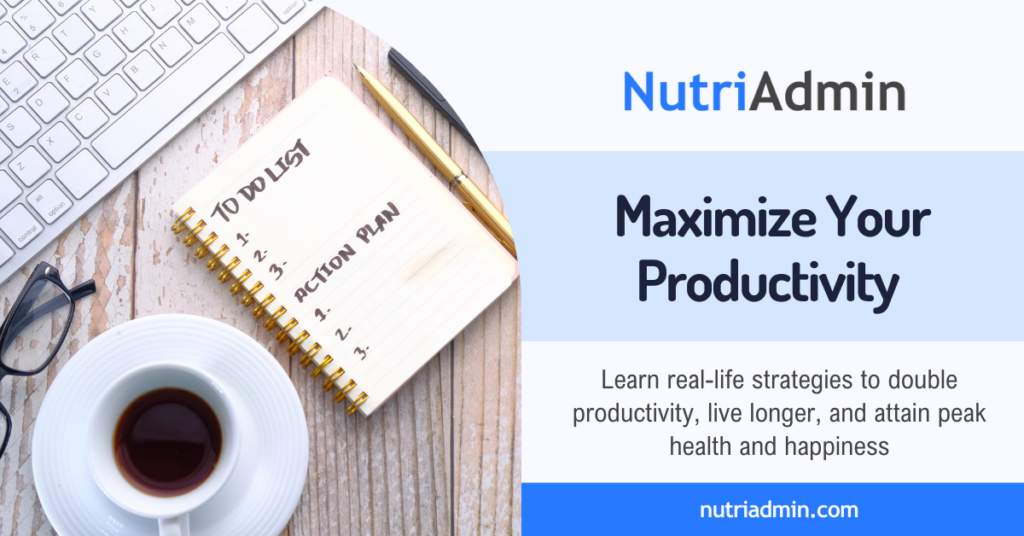I have recently been asking nutritional therapists why they chose their profession. I often hear answers in the lines of I enjoy empowering individuals to heal themselves by improving their diet. This makes sense, a passion for people is crucial in any occupation where you deal with clients at such a personal level. It must be extremely rewarding to have such a positive impact in the lives of so many men and women.
On the other hand, I have also been asking nutritionists what part of their jobs they like the least. In 90% of the cases, the answer was paperwork or admin work. Most of them reported spending 2-4 hours per day just managing client data, writing reports, or organising financial aspects of their business. Luckily, there are many ways to make admin tasks more efficient.
This article is all about how to cut down time spent doing paperwork so that you can focus more in interacting with clients. Our software for nutritionists, NutriAdmin is based in the philosophy outlined below.
On the other hand, if you want to develop personal habits to be more productive, we have you covered. Check out the productivity machine in-depth guide to become your best self!
Background
I am not a nutritionist, but I have a solid knowledge on optimising business processes. Last year, I worked for a large financial corporation in London doing precisely that. My role consisted in analysing how different teams worked across the company, finding inefficiencies, and introducing better processes or software tools that could do time-consuming tasks automatically. The end result was always saving employees time, so that they could focus their energies in tasks that computers cannot do, e.g. dealing with customers.
Based on my experience with data management and process implementation, coupled with content from several conversations I have had with nutritionists ‐ here are my top 3 productivity tips to do less paperwork in your nutritional therapy practice.
1. Go paperless
It should be obvious that storing data in computers rather than on paper will keep your business organised and will make it easier to run. Then, why do so many nutritional therapists still rely heavily on paper? My guess is that many of them start a private clinic and build a client base steadily over time. At first they have few clients and paperwork is easy to manage, so they decide to do it manually. However, as the number of patients grows, it becomes increasingly harder to switch to software due to lack of time, and being ingrained in your current process despite its inefficiencies.
My suggestion would be to migrate your client data, appointments, reporting, and any other business paperwork to a software solution as early in your business development as possible. Doing admin work on paper does not scale well, and having many clients can result in a curse rather than a blessing if you have to spend 5 hours per day sorting their files. What is even worse, if your client data is not organised properly, you risk missing important details about a client and giving sub-optimal advice due to lack of context. An undesirable situation both for you as a professional and for your patients wellbeing.
Don’t postpone migrating your data to a digital solution until it is too late, or it will get harder and harder every day.
2. Automate repetitive tasks
By interviewing dozens of nutritionists, I realised there are many tasks in their job that are repetitive. Examples include:
- Booking-in clients and scheduling their visits
- Sending questionnaires, disclaimers, and other relevant documents prior to a patient visit
- Writing reports: some paragraphs, links, or tables are repeated frequently across clients with similar symptoms/goals
- Sending reminder emails for clients to take actions on specific points
- Styling and formatting documents to match your branding
- etc
Fortunately, we live in the age of technology. Computers excel at performing all of the listed repetitive tasks and much more. You just need to give them instructions once on what it is you want to achieve and you will have the most boring manual tasks automated.
Automating monotonous tasks is a big win both for you and your clients: You save time, and this time can be used to provide your patients with a better service. Your time is far more valuable as an advice curator, and your vast knowledge on the field of nutrition is your asset. Focus your energies in identifying the best solution for your clients and communicating it effectively rather than in copying/pasting millions of paragraphs over and over.
3. Let your clients work for you
This may sound a bit strange, but there are serious advantages in delegating certain aspects of your work to your own clients ‐ specifically, data management. Clients can be responsible for keeping daily/weekly records on fitness tracking (weight, waist circumference, etc), or meal journals for example.
Many nutritionists ask their clients to keep meal journals or track their weight, however, it is not as easy. It is hard for clients to form new daily habits, and it is difficult for the nutritionist to encourage them at the right times. Often nutritionists will keep emailing clients at regular intervals reminding them to fill in their daily meal journal, but this is extremely inefficient. After having many clients, there will be many gaps in your data unless you implement a bullet-proof process.
A better way to manage client data would be to grant patients access to their own profile in your database. They can log in daily and update their metrics. There is a great psychological feeling of accomplishment when you log your own progress towards a goal. Whenever a client forgets entering data, she gets an automatic email reminder. And from time to time you can check a summary progress report for your client, and can provide feedback based on complete data rather than obsolete or incomplete records. A win-win for everyone involved.
Putting it all together
NutriAdmin, is the fruit of our collaborative effort with hundreds of therapists providing feedback. We are good with software, data management, and business processes. Nutritionists can identify exactly the big pains in running their businesses and design suitable solutions. We have constructed this software together based on some of the points outlined above and more. The objective is to reduce paperwork for nutritional therapists so that they can spend more time with clients, understanding their needs and coming up with suitable advice.
The list is obviously non-exhaustive, and the software continues to grow and improve every day. There are aspects that perhaps I have left out. If you have any ideas on how to further improve the solutions or want to comment I encourage you to do so.
Thanks for reading,




